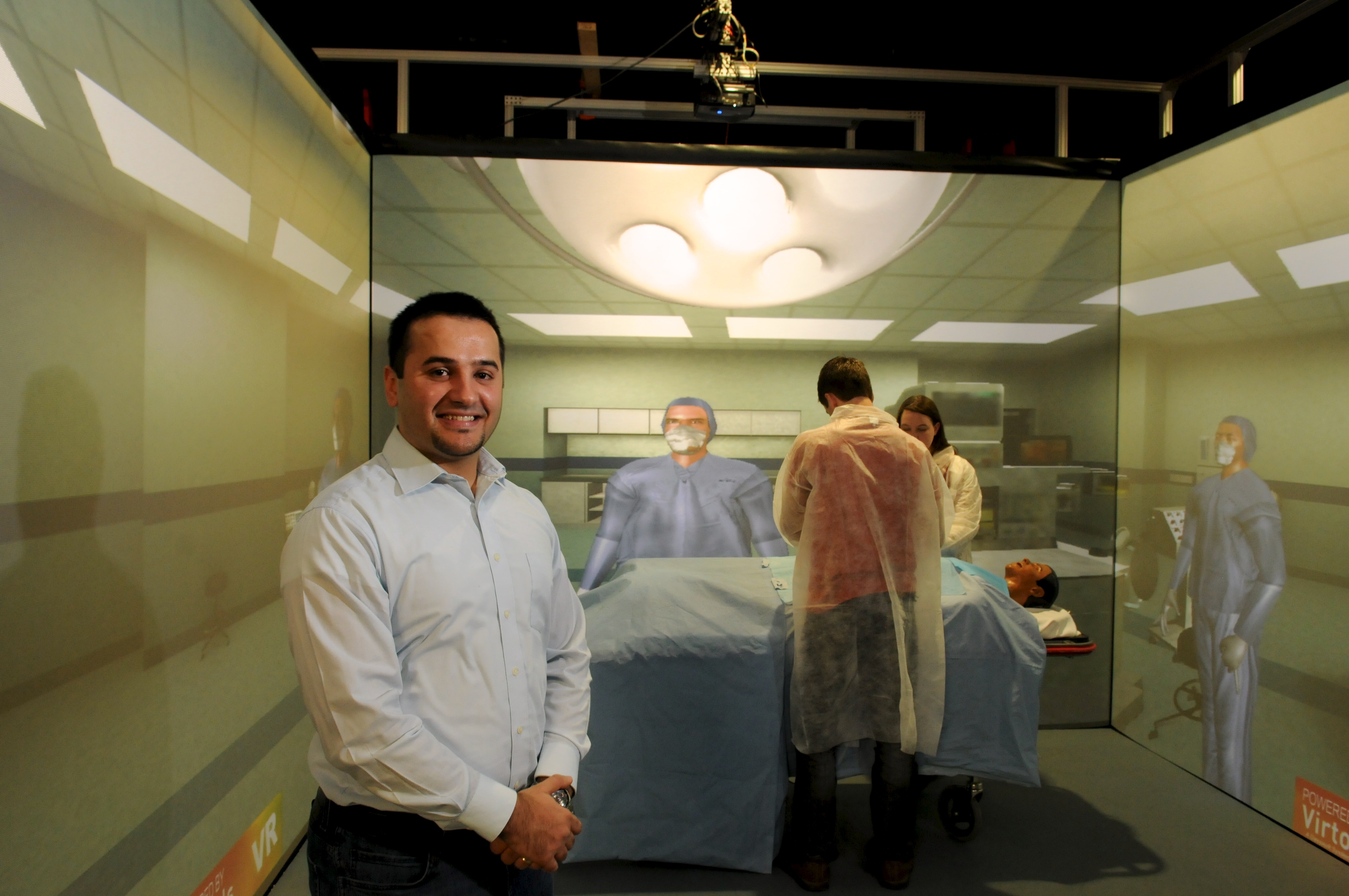Department of Computational Modeling & Simulation EngineeringResearch
Laboratory Facilities



Faculty Research & Articles

AI and the Future of Machine Design, Digital Design and Manufacturing (by Dr. Ahmed Noor)

Game Changers, Mechanical Engineering (by Dr. Ahmed Noor)
Additional Research:
The Connected Life: The Internet of Everything Coming to a Building Near You, Mechanical Engineering (by Dr. Ahmed Noor)
Potential of Multimodal and Multiuser Interaction with Virtual Holography, Advances in Engineering Software (by Dr. Ahmed Noor and Dr. Rifat Aras - PhD in Modeling and Simulation)
Smart Stethoscope Saves Lives (featuring Dr. Rick McKenzie)
Explore Our Research Interests
| Name | Research Interests |
|---|---|
| Yuzhong Shen, PhD Associate Professor and Graduate Program Director |
Game-based learning; visualization and computer graphics; modeling and simulation; and, signal and image processing. |
Jim Leathrum, PhD |
Parallel and distributed simulation, hardware and software simulation architectures, and applications of discrete event simulation to multi-modal transportation systems. |
| Michel Audette, PhD Assistant Professor |
Medical applications in M&S including imaging and surgery. |
| Bharat Madan, PhD Professor |
Network and cyber security applications. |
Roland Mielke, PhD |
Systems theory, mathematical modeling, modeling and simulation education, application of continuous simulation in electrical engineering, and applications of discrete event simulation in transportation and enterprise decision support. |
| Ahmed Noor, PhD Eminent Scholar and William E. Lobeck Professor |
Computational mechanics, multi-scale modeling and simulation, interactive visual simulation, and advanced simulation-based learning environments. Intelligent knowledge discovery and exploitation (beyond AI), cognitive computing and cognitive engineering systems. |
John Sokolowski, PhD |
Human behavior modeling; decision system modeling; multiagent system simulation; and, modeling and simulation representation of social systems |
| Masha Sosonkina, PhD Professor |
Physical based modeling and high performance computing and simulation. |
| Name | Research Interests |
|---|---|
N. Rao Chaganty, PhD |
Large deviations, generalized linear models, estimating equations |
| Duc Nguyen, PhD Joint Appointed Professor with Civil and Environmental Engineering |
Linear/Non-linear constraint optimization numerical algorithms and software; Cluster Parallel MATLAB Computing for large-scale, real time computer simulation; Finite Element Analysis/Solution for PDE general field problems; Efficient algorithms for large-scale Shortest Paths in "transportation networks"; Computational (Engineering) Mechanics; Efficient algorithms/software for solving large-scale "simultaneous linear/non-linear equations", and "general eigen-value" problems |
| Name | Research Interests |
|---|---|
| Catherine M. Berry, PhD | International studies; modeling of social networks |
| Multi-agent simulation, multivariate statistics, scheduling, Markov processes, and mathematical modeling | |
| C. Donald Combs, PhD | Medical modeling and simulation, gaming applied to health professions education, geospatial health research and health professions education |
| Interoperability of simulations; composability of models. | |
| Rafael Diaz, PhD | Operations research, operations management, production and healthcare and public health systems, dependence modeling for stochastic simulation, and simulation-based optimization methods |
| Barry Ezell, PhD | All-hazards Risk and Decision Analysis; Operations Research Systems Analysis; Probabilistic Risk Assessment; Capabilities-Based Assessment; Group Facilitation; Insurgency and Terrorism M&S |
| Thomas Holland, PhD |
Detection and characterization of emergent phenomena in natural and synthetic systems; intentional emergent behavior, systems-of-systems; role of simulation in expression, visualization, and understanding of complexity in systems of systems. |
| Johnny Garcia, PhD | Combat Modeling |
| Jose Padilla, PhD | Human, social, cultural, and behavior modeling; epistemology of modeling and simulation; systems engineering and engineering management. |
| Yiannis Papelis, PhD | Robotics and autonomous systems; semi-autonomous agents; virtual environments and immersive games; and, discrete event and continuous simulations. |
| Krzysztof Rechowicz, PhD | Medical applications in modeling and simulation. |
| Mike Robinson, PhD | Transportation modeling; evacuation modeling; and, decision making. |
| Andreas Tolk, PhD | Model-based systems engineering, which includes research on modeling and simulation interoperability challenges, in particular in the context of complex systems and system of systems. |
| Eric Weisel, PhD | Operations research; applied statistics, including design of experiments; advanced mathematics; modeling and simulation; and, nuclear engineering. |




